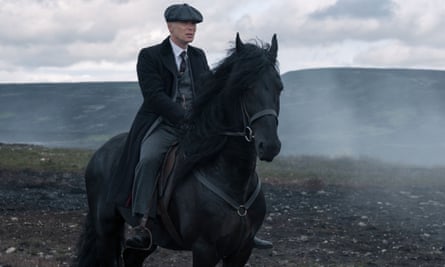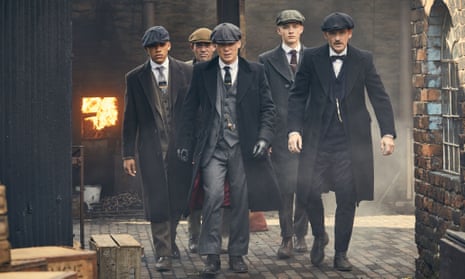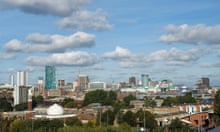Years ago a kangaroo escaped from Dudley zoo. That’ll put Dudley on the map, mused locals laconically. History doesn’t record whether the animal was recaptured or whether, as a beautiful dream once suggested to me, it made a living as a bare-knuckle fighter behind some lock-ups until it could afford passage home.
But that’s not the point of the story. The point is nothing, not even rogue kangaroos, or Cuddles the killer whale, could put Dudley on the map. For a long time, the same was true of its try-hard neighbour, Birmingham. Brummies have always been blessed with an excess of civic pride. Didn’t the world know that Birmingham was special – city of a thousand trades, true cradle of the Industrial Revolution (Manchester? Forget about it), the place the world’s greatest sauce (HP), the world’s best chocolate (Cadbury’s Creme Egg) and the world’s greatest curry (balti, from the Urdu for bucket) were made?
The problem was no one believed the hype beyond the outer ring road. And then in 2013 something happened. The proverbial kangaroo escaped. Birmingham became chic and Stephen King tweeted: “Watching a cool British series called Peaky Blinders.” A TV series about veterans of the first world war-turned-gangsters who carry razor blades in the peaks of their caps down the many mean streets of Small Heath suddenly caught fire, with tastemakers as improbable as Brad Pitt, Julia Roberts, Dennis Lehane, Michael Mann and Ed Sheeran. David Bowie was a fan, suggesting his music be used in the show. There’s no easy way to say this, but its extraordinary transatlantic appeal was made possible by the disgraced sexual predator Harvey Weinstein. He bought the American rights and, as a result, it wound up on Netflix, watched by – among others – Snoop Dogg. As Peaky achieved cult status, one early headline called it “The good, the bad and the Brummie”. And the show’s star, Cillian Murphy, playing cap-wearing gang capo dei capi Tommy Shelby, is essentially Clint Eastwood without a poncho but in starched collar and flowing topcoat; a man of few words but eloquent moody equestrian silhouettes as he rides across the wild West Midlands.
It isn’t so much a spaghetti western, as a spaghetti junction western, with its creator, Steven Knight, honouring the city of his Small Heath grandparents. And one of the great pleasures of the show for me, too, is seeing approximations of my own sharply dressed working-class Black Country grandfathers, from nearby Wednesbury, redeemed from historic erasure. Not that my ancestors went tooled-up down the towpath, so far as I know.

What is the source of the fascination? Peaky Blinders has all the tropes of the American gangster genre, with Shelby as a mash-up of Michael Corleone and Tony Soprano, but unlike the contemporaneous Boardwalk Empire, there is British sociopolitical subtext: the Peaky Blinders are icons of the antinomian underclasses; they are the lions led by donkeys at the Somme, the women who took on traditionally male roles in the first world war and were disinclined to return thereafter into the kitchen. While Russia and Germany rose in revolution, the imagined women and men of Peaky Blinders – outraged to find victory means nothing to their hopes – find another way, taking their due by any means necessary. Where the underlings of that other global franchise – Downton Abbey – bend the knee, Peaky Blinders rise up.
Fast forward and the tide of popular resentment at elite mismanagement has been pretty high since the global crash. It is not fanciful to suppose that Peaky Blinders resonates in Brexit Britain, where ignored underclasses seize the agenda from a self-involved establishment, be it in Westminster or Brussels (significantly, Tommy Shelby has become a Labour MP). Not that you need to be a leaver to admire the show; indeed its star, Murphy, an Irishman, recently proved himself a sharp critic of Brexit ambitions. Whatever the reasons, cult is cult. Since 2013, there have been Peaky Blinders-themed bars in London, a Peaky Blinders convention in Santa Monica, guided Peaky Tours in Digbeth and a 4.4% Peaky Blinder Black IPA made with five kinds of hop. Garrison, official Peaky Blinders tailor, offers a chance for all you slobs out there to get duded up in herringbone tweed suits, newsboy caps and collarless Henley shirts, though disappointingly not, so far as I can see, starched collars.
As season five of a projected seven starts on BBC One this Sunday, though, there are problems. Even Helen McCrory, who plays Aunt Polly in the show, complains its violence is unwatchably horrific. In 2019 Britain, ravaged by knife crime, glamorising blade-wielding gangsters may be seen to strike an unfortunate note. It’s possible we’ve reached peak Peaky. Beau Brummies, whose cultural and sartorial rebranding depends on the world remaining captivated by century-old West Midlands gangsters, must hope otherwise.









